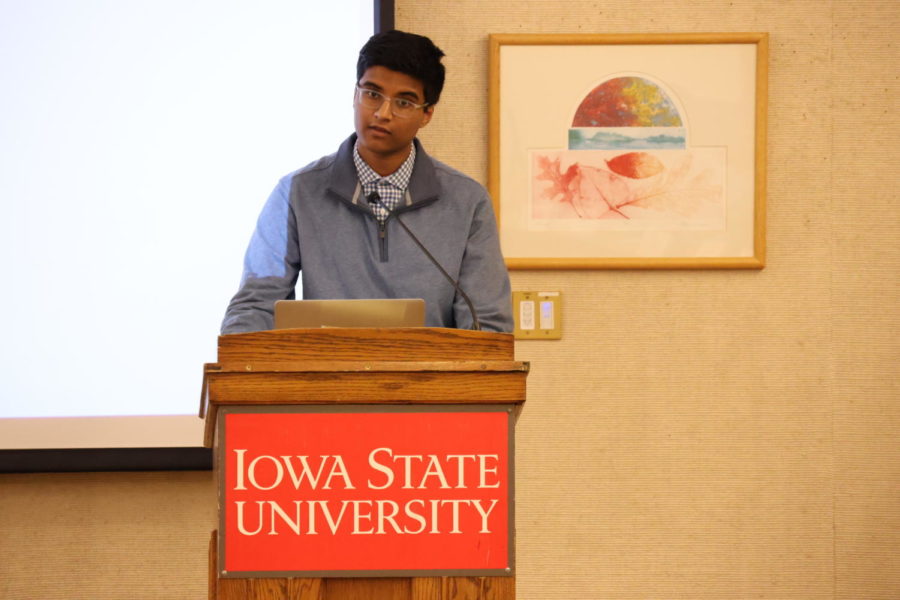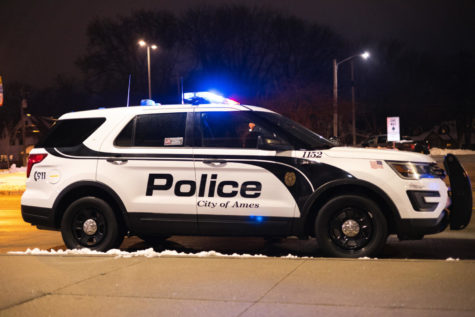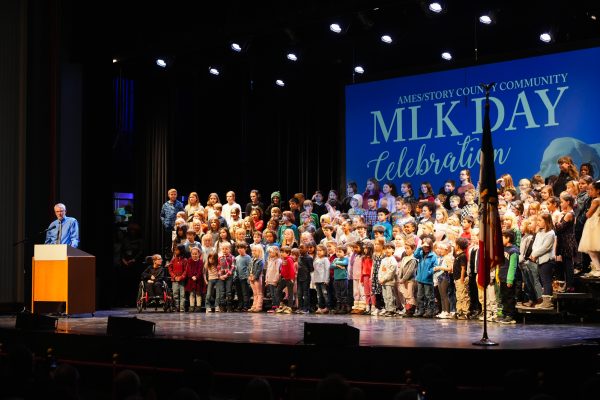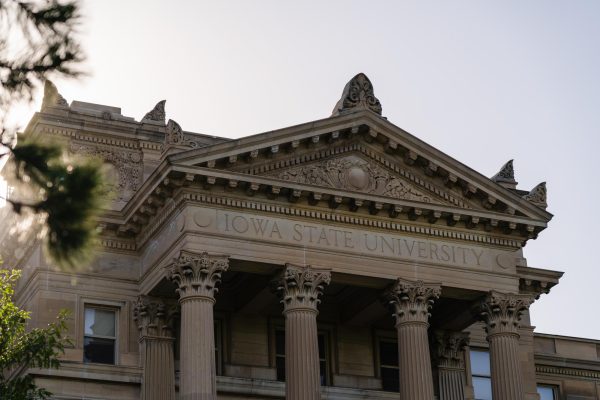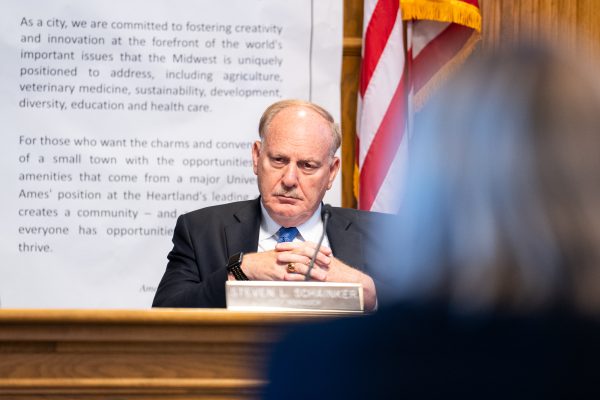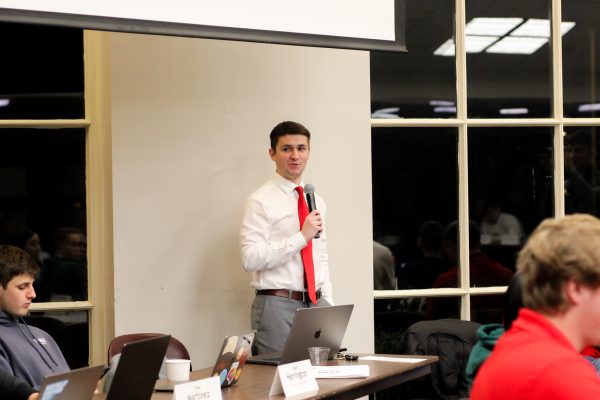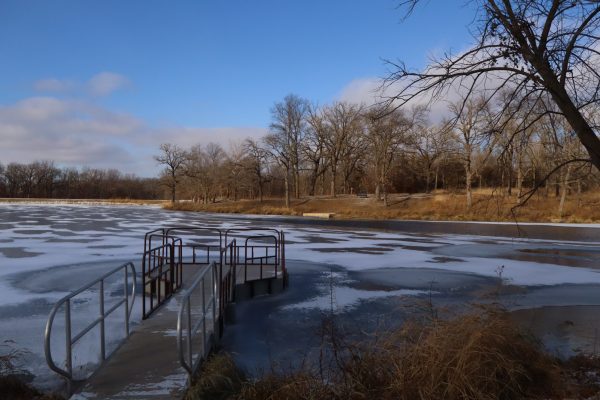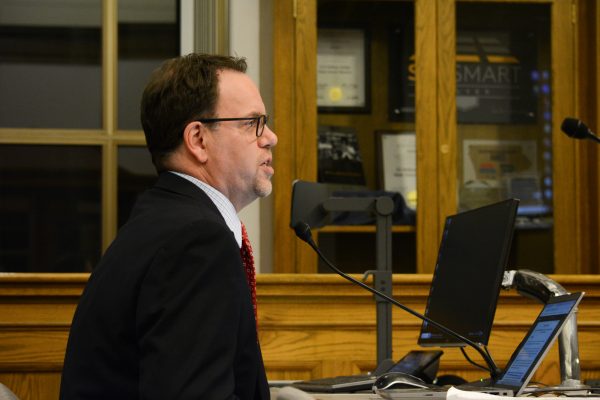StuGov receives public comment on outdated website
Liberal Arts and Sciences Senator Asray Gopa, a freshman in computer science, speaks at the Student Government meeting on Jan. 25, 2023.
Student Government was criticized for their candidate onboarding process, disorganized website, outdated election information and lack of communication on Wednesday.
Rebecka Larson, a junior majoring in agricultural policy, pointed out that the statement of intent form for executive slates was due prior to the start of the spring semester.
“The intent forms for the executive slate were due Jan. 13, and for those of you who know, that date is before the semester starts,” Larson said.
Larson said the Student Government website election registration forms for executive slate and senator positions have outdated and incorrect information.
“Even if you wanted to run as an executive slate or as a senator, none of the correct information is on there,” Larson said. “None of the correct forms are on there, nothing’s updated, and nothing was posted on social media with the correct forms or updates.”
Larson said the student body was not supplied with the correct forms or information, and after reaching out to the election commissioner, she said it became apparent that the correct forms were not publicly available.
“If you go on the Student Government website, the correct forms weren’t even there, nor the 2023 election code,” Larson said.
Due to her lack of access to the proper resources, Larson was denied the ability to run as a regular candidate and is now a write-in candidate. She said she believes this was not discrimination but negligence.
Larson said as a write-in candidate, she has more disadvantages than not, such as the inability to obtain certain campaign funding or participate in official debates. Additionally, write-in candidates will not be posted on the Student Government website or an option on the ballot.
Jaden Ahlrichs, a senior majoring in global resource systems and vice president of Student Government, said the issues are due to communication difficulties between the election commission and the director of information technology (IT).
“It’s just been one of those communication issues where our election commission may not have given him [the director of IT] the correction to update the website, but that is being resolved after last night’s open forum,” Ahlrichs said.
Ahlrichs said the information will be updated, and the Senate is working to correct incorrect information and ensure accuracy. He said he is grateful that Larson brought up the issue.
“The website is always something we are talking through, and I’m happy that Rebecca Larson came forward and pointed this out,” Ahlrichs said. “It’s not always one of our first thoughts, but it’s something that we obviously want to be up to date and available for everyone.”
Cody Neeper-Burris, a senior majoring in political science and the electoral commissioner, talked about the function of the electoral committee.
“We do function as a separate organization so that we also have some independence to shield the elections from interference,” Neepur-Burris said.
Neeper-Burris confirmed there have been issues with updating the information on Student Government’s website; however, she said contact information was available on the site for students who needed it.
“We have had issues with updating the website and with other communications throughout the year, and that did impact the information that was available on the election commission website,” Neepur-Burris said. “However, my contact information was updated on the website and was there for students to use if they needed to contact me.”
Neeper-Burris said the deadline for statements of intent was put in place to account for the time frame between campaigns turning in their statements and receiving their purchase cards which have a specific shipment time.
“We didn’t choose that date to make it harder for students to run,” Neepur-Burris said. “We chose that date for logistical reasons, and it matched with the timeline that we had last year that worked well for us.”
Edward Mahoney, a graduate student in computer science and speaker of the Senate, said the outdated election information is related to the election commission being a semi-independent organization.
“Moving forward, the biggest thing is giving the election commission perhaps more ability to directly edit the website, as well as some better communication happening,” Mahoney said
Mahoney said the Senate put a lot of trust in the election committee, as they have been responsible in the past. He suggested increased involvement by chief officers such as the speaker, the president and the chief justice to further monitor the election commission.
Confirmations
Erin Musselman, a freshman majoring in pre-graphic design, was confirmed as an at-large member of the public relations committee.
Musselman said after attending a public relations committee meeting, the Women’s Day events caught her eye.
Reghan Robinette, a junior majoring in microbiology, was confirmed to the student initiatives committee as an at-large member.
“I would like to learn more about PR and outreach essentially, and joining PR, I think would help me do better in my role as outreach and education subcommittee in sustainability,” Robinette said.
Madeline Willits, a senior majoring in graphic design, was confirmed as an at-large to the public relations committee.
Katherine Engelken, united residents off-campus senator and a senior majoring in animal ecology, was confirmed as a senator on the public relations committee.
Motions Passed
The Senate voted unanimously to fund the Iowa State Equestrian Hunt Team for the amount of $3,758.40.
Victoria Jezioro, a junior in animal science and president of the hunt team, went into detail about the goals of the club opportunities for participants.
“It’s really important to show students are able to compete and to continue riding and expanding our ability as a rider, and this also gives, I would say, students an opportunity to regional or national level,” Jezioro said.
The hunt team had requested funding for venue rental of stalls and an arena, jump rental and horse transportation.
The Senate voted to fund Good Earth Student Farm with $4,690 for transportation, high tunnel and acre rental.
Sarah Mattingly, a senior majoring in food sciences and president of Good Earth Student Farm, provided insight into the farm’s needs and why students would benefit from the funding.
“Our biggest costs are, what I would say, charges us, so the transportation, the high tunnel rental as well as our greenhouse rentals, but those are all unnecessary requirements in order to run a farm as well as run an equitable farm so that we make it fair to any student that wants to participate,” Mattingly said.
Mattingly said all but three members of the Good Earth Student Farm are students or faculty at Iowa State.
Your donation will support the student journalists of the Iowa State Daily. Your contribution will allow us to purchase equipment, send our student journalists to conferences and off-set their cost of living so they can continue to do best-in-the-nation work at the Iowa State Daily.


